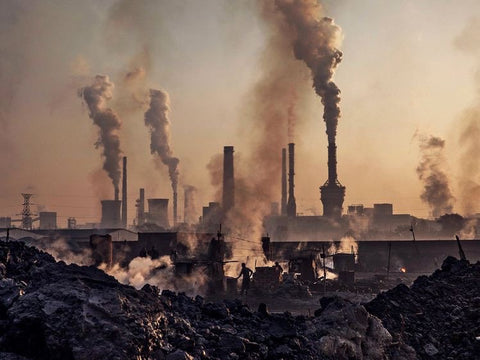
April is Earth month and I’m sure like mine, your social feed has been full of sustainability posts all month long. One of the biggest takeaways for me is, we as a collective people, do not know how to properly recycle. Additionally, we do not comprehend ways in which our inability to enact enact sustainability into our lifestyles directly impacts the rate at which global warming progresses. Climate change is a global issue affecting all of us but the impact of climate change is not felt equally across all communities. Research has shown that communities of color and low-income communities are disproportionately impacted by the effects of climate change. This phenomenon, environmental racism, occurs when marginalized communities bear the brunt of environmental harm. You’ve more than likely heard this term before but do you know what it actually means? Let’s dive deeper.
The Disproportionate Impact of Climate Change on Black Communities
I would like to take a minute to break down the ways in which climate change impacts Black and Brown communities and why environmental justice is essential for our future and the future of our children. Black and Brown folks are more likely to live and work in areas affected by climate change such as coastal regions, flood-prone areas, and areas with poor air quality. Their communities are also more likely to have inadequate infrastructure, making them more vulnerable to the effects of extreme weather events such as hurricanes, floods, and heatwaves.
A study conducted in the United States found that Black Americans are exposed to higher levels of air pollution than White Americans. The study found that Black Americans are exposed to 38% more polluted air compared to White Americans. There are a variety of factors at play including historical and current systemic racism, socioeconomic status, and residential segregation.
Historically, Black folks were often forced to live in areas with high levels of pollution, such as near industrial plants and highways, due to discriminatory housing policies and practices. These practices, such as redlining, restricted Black people's access to housing in more desirable and less polluted areas. As a result, Black communities are still concentrated in areas with higher levels of pollution. Moreover, Black people are also more likely to have jobs that expose them to air pollution, such as jobs in factories and the transportation industries.
Overall, the disproportionate exposure to air pollution and living in areas with high levels of pollution are the result of systemic and structural inequalities that put Black an Brown folks at a disadvantage for generations. Addressing environmental racism and promoting environmental justice is crucial to ensure that all communities have access to clean air, water, and a healthy environment. Cancer Alley, Louisiana’s petro, chemical plants and refineries, South Bronx, New York’s waste, incinerators, and other industrial facilities, East Chicago, Indiana’s high levels of lead and arsenic, Standing Rock, North Dakota’s drinking water and sacred land being threatened by South Dakota Access Pipelines and one we all know too well— the ongoing lead pollution of the drinking water in Flint, Michigan. These are all Black, Brown and Indigenous communities.
Environmental Justice: A Solution to Climate Injustice
The need for Environmental justice becomes more and more apparent as the effects of global warming increase, disproportionately affecting Black and Brown folks. Marginalized communities have historically been excluded from decision-making processes and muted regarding environmental policies that directly affect their communities. Environmental justice seeks to address this imbalance by empowering Black and Brown communities. By ensuring that marginalized communities have equal access to clean air, water, and a healthy environment, we can build a more equitable and sustainable future.
Taking Action to Address Environmental Injustice
There are several ways that we can take action to address environmental injustice like support policies that promote environmental justice—advocating for climate action at the local, state, and federal levels.
We can also support organizations that are working to promote environmental justice. There are tons of grassroots organizations doing important work with marginalized communities to promote environmental justice. (Scroll to learn about a few to get you started)
I think changing environmental policy is super important but I think it is equally important we all take action in our own lives to reduce our impact on the environment. This can include reducing our energy consumption, using public transportation or biking instead of driving, and reducing our consumption of meat and dairy products. These are all things we can do start doing immediately.
Here at DEHIYA, we know that environmental pollution is destroying our earth —and BIPOC communities at a disproportionate rate. Sustainable Beauty is more than a trend, it is quite literally, the difference between having access to clean air and water or not. From the way we source and produce our products to the way we package them and share them with you, sustainability is a core DEHIYA value. As we continue to roll out or refresh, I’m excited for you to see the ways we are striving to be low-waste.
Here are five organizations that are committed to ending environmental racism and promoting environmental justice:
- NAACP Environmental and Climate Justice Program: The National Association for the Advancement of Colored People (NAACP) has a program focused on addressing environmental and climate justice issues that disproportionately affect Black communities and other communities of color. They work to promote policies and solutions that promote environmental justice, protect public health, and ensure access to clean water and air.
- Indigenous Environmental Network: The Indigenous Environmental Network is an alliance of Indigenous peoples from North and South America who work to protect the rights, lands, and cultures of Indigenous peoples and promote environmental justice. They advocate for the recognition of Indigenous rights, protection of sacred lands, and a just transition to a sustainable, regenerative economy.
- Environmental Defense Fund: The Environmental Defense Fund is an environmental advocacy organization that works to protect public health, protect wildlife and ecosystems, and promote sustainable solutions. They work on issues related to climate change, clean air and water, sustainable food systems, and other environmental justice issues.
- Green For All: Green For All is a national organization that works to build an inclusive green economy that creates good jobs, reduces poverty, and promotes environmental sustainability. They work to advance policies and programs that address climate change and promote equity and inclusion in the green economy.
- Union of Concerned Scientists: The Union of Concerned Scientists is a science-based advocacy organization that works to promote science-based solutions to environmental and social justice issues. They focus on issues related to climate change, clean energy, sustainable agriculture, and other environmental justice issues, and advocate for policies that promote a just transition to a sustainable, equitable future.




Comments (0)
There are no comments for this article. Be the first one to leave a message!